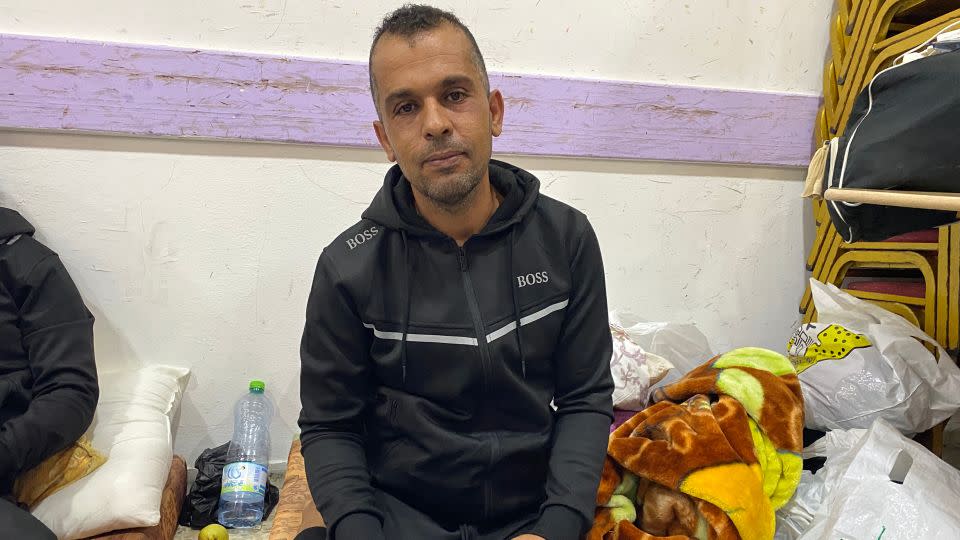Israel expels Gazan workers back to war-torn enclave
Dozens of Palestinian workers in Israel returned to besieged Gaza on Friday following an Israeli government decision to expel Gazan laborers from the country.
The workers were among the Gazans who were in Israel early last month, when Hamas launched a brutal assault on the country, killing 1,400 people and kidnapping more than 200. Israel retaliated with an unrelenting bombing campaign on Gaza.
Prior to the October 7 attacks, about 18,000 Gazans had permits to cross into Israel and work, where they could earn significantly more than in Gaza.
“Israel is severing all contact with Gaza. There will be no more Palestinian workers from Gaza. Those workers from Gaza who were in Israel on the day of the outbreak of the war will be returned to Gaza,” the government press office said Thursday.
Men of all ages could be seen entering Gaza through the Kerem Shalom crossing in southern Israel on Friday, in CNN footage filmed inside the war-torn territory. Some prayed or kissed the ground, some greeted friends and family, and some told of alleged mistreatment in Israel.
“What happened to us never happened to any human being before,” one of the men told CNN. “They suspended our permissions. We tried to go to the West Bank. They detained us and put us in places we never knew where we were.”
CNN has reached out to the Israeli government for a response to the allegations.
The cabinet also said it would deduct funds that are designated for Gaza, including funding from the Palestinian Authority – a separate government body with limited self-rule in the Israeli-occupied West Bank – that would go to the strip.
Over the past few years, Israel began issuing thousands of work permits for Gazans to cross into Israel as part of an economic incentive strategy Israeli authorities had hoped would encourage Gazans to distance themselves from Hamas. The enclave is home to more than two million people, most of them refugees.
Gazans in the West Bank told CNN last month that getting a work permit for Israel allowed them to become vital breadwinners. Many are the only members of their families to have a job and the salaries they earn in Israel are multiple times higher than anything they’d be able to get in Gaza.
Following Hamas’ terror attacks, the Israel Defense Forces (IDF) shut all access to the enclave and many Gazans working in Israel became stuck.

“I always wanted this permit because the situation in Gaza is very dire. The financial situation, the debt … the economy is zero. There’s no work opportunities,” Ismail Abd Almagid told CNN last month, adding that he had been unemployed until he got the permit.
Unemployment levels in Gaza are among the highest in the world, with nearly half of the population out of work, according to 2022 UN data. More than than 80% of the population lives in poverty.
“For at least the last decade and a half, the socioeconomic situation in Gaza has been in steady decline,” UNRWA, the UN’s main aid agency in the enclave, said in August.
For nearly 17 years, Gaza has been almost totally cut off from the rest of the world, with severe restrictions on the movement of goods and people.
The 140-square-mile enclave is ruled by Hamas but blockaded by Israel and Egypt, since 2007, and relies heavily on imported fuel and electricity to run all its services.
In response to Hamas’ terror attacks, Israel imposed a “complete siege” on the enclave and stopped all food, water, medicine, and fuel supplies from entering Gaza, deepening a humanitarian crisis.
Israeli airstrikes have killed over 9,000 people, half of them children, and injured about 22,000 others, according to figures released Thursday by the Palestinian Ministry of Health in Ramallah, which draws from sources in the Hamas-controlled enclave.
Humanitarian organizations have described catastrophic conditions where civil order is starting to break down, and have issued increasingly urgent calls for a ceasefire to allow desperately needed aid into Gaza. UNRWA Commissioner General Philippe Lazzarini said on Wednesday after his return from Gaza that “the scale of the tragedy is unprecedented.”
“The levels of distress and the unsanitary living conditions were beyond comprehension,” he said. “Everyone was just asking for water and food.”
On Thursday, the Palestinian Red Crescent Society (PRCS) confirmed that it received fresh food, water, relief and medical supplies from 106 aid trucks from the Egyptian Red Crescent that crossed into Gaza from the Rafah Crossing. The PRCS said that this brings the total number of trucks that have crossed successfully from Egypt into Gaza to 374.
Before the war began on October 7, Gaza received about 455 aid trucks per day, according to the United Nations.
But aid agencies warned the aid trickling into Gaza is vastly insufficient to stave off the dire humanitarian crisis.
CNN’s Ivana Kottasova and Zeena Saifi contributed reporting.
For more CNN news and newsletters create an account at CNN.com
